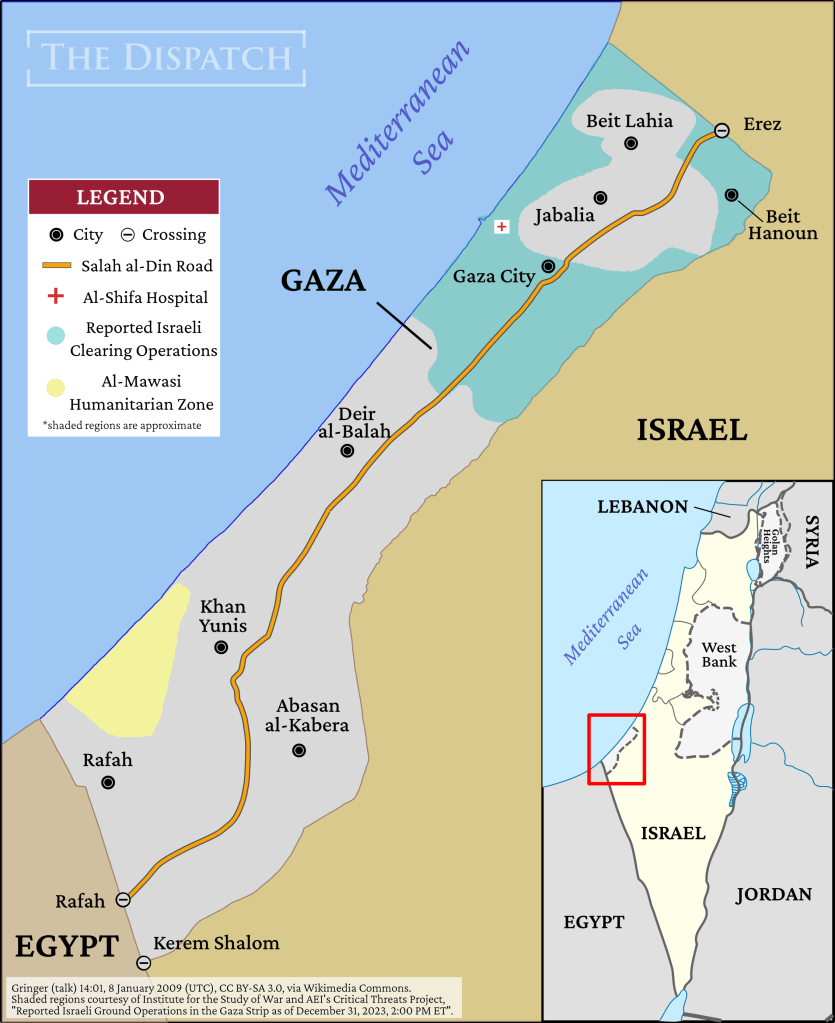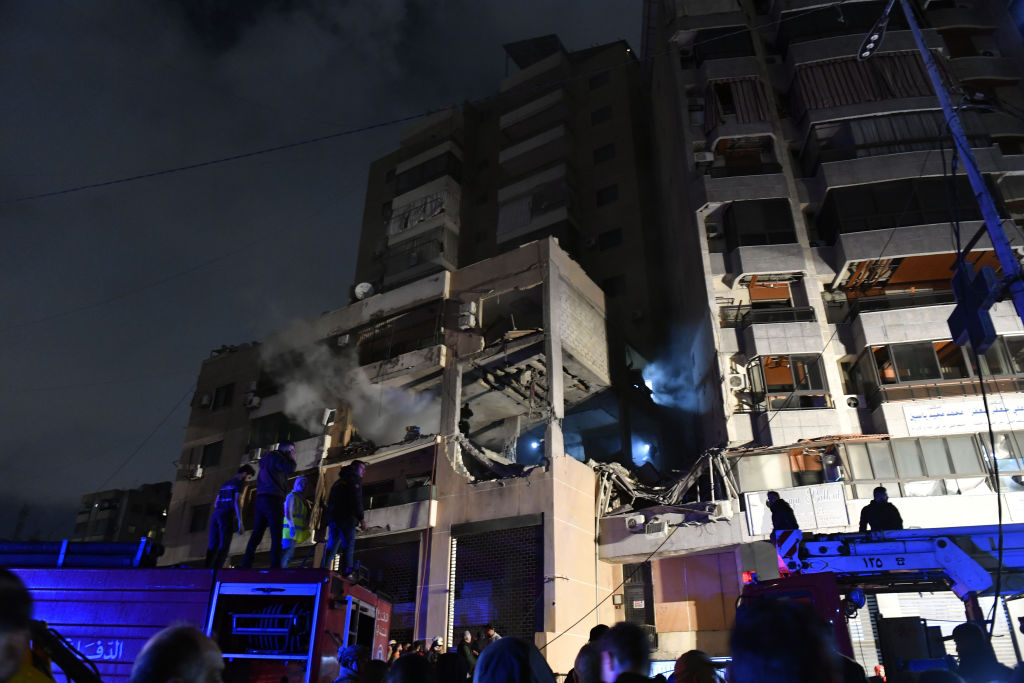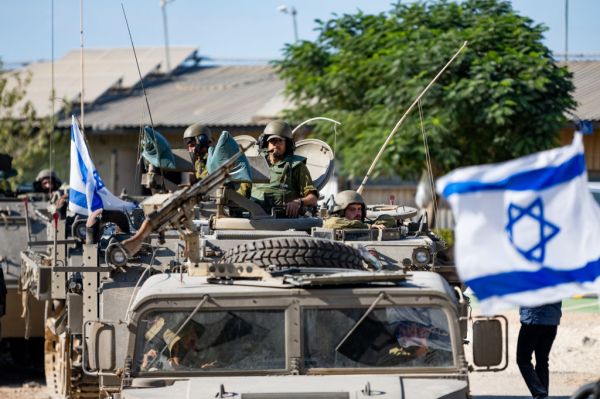TEL AVIV, Israel—On Tuesday night, the eve of the fourth anniversary of Quds Force commander Qassem Suleimani’s assassination in Baghdad, Iraq, another key player in Iran’s resistance network died in a mysterious blast. In a Hezbollah-dominated suburb of Beirut, Lebanon, Hamas deputy leader Saleh al-Arouri and at least six other members of the Palestinian terrorist organization were killed in an alleged Israeli drone strike.* The region is now bracing for the prospect of a severe retaliation by Hezbollah from Lebanon, including the possible use of long-range missiles to target central Israel. But this latest escalation follows months of attacks on Israel, from multiple fronts.
“We are in a multi-arena war, we are being attacked from seven different sectors,” Israeli Defense Minister Yoav Gallant told the country’s parliament last week, referring to military activity out of Gaza, Syria, Lebanon, the West Bank, Iraq, Yemen, and Iran.

In Gaza, the primary focus of Israel’s war effort, the Israeli Defense Forces (IDF) continues to push deeper into the northern part of the Strip. But rockets fired from Jabalia into Israel at midnight on New Year’s Eve made clear that the insurgency in the north has only just begun. Southern Gaza—where senior Hamas leaders are believed to be hiding among the civilian population in densely populated Khan Yunis—poses an even greater strategic challenge to Israeli officials, who have vowed to see their initial goal of dismantling the terrorist group’s foothold in the enclave through.
“We will end this campaign when Hamas does not function as a governing body, and certainly not as a military framework,” Gallant told troops at the frontline in Gaza on Tuesday. “At the same time, unfortunately, there are other threats, the first and most prominent of which is what is happening in the north,” he added, referring to Lebanese Hezbollah.
Continued rocket and missile attacks by Hezbollah have inflicted massive damage on communities along Israel’s northern border with Lebanon, forcing some 86,000 people from their homes. But the cross-border exchanges are just a small taste of the Lebanese group’s firepower. Thanks to its Iranian patrons, Hezbollah now boasts an arsenal of roughly 150,000 rockets and missiles, including sophisticated precision-guided munitions.
To combat this threat, Israeli officials have threatened Hezbollah with preemptive military action if it doesn’t withdraw its forces north. “If the world doesn’t get Hezbollah away from the border, Israel will do it,” War Cabinet Minister Benny Gantz said last month.
The U.S., meanwhile, is pushing for a diplomatic solution. American and French envoys arrived in the region this week in an apparent effort to pressure Lebanon to enforce the 2006 United Nations Security Council Resolution 1701, which brought about the end of the Second Lebanon War by requiring Hezbollah to move its forces north. The resolution has never been implemented by either the Lebanese armed forces or United Nations peacekeepers.
“Israel says very clearly that it demands the implementation of 1701, and if this doesn’t happen, it will go to war,” Eyal Zisser, a professor of Middle Eastern and African studies at Tel Aviv University, told The Dispatch. “What the United States is trying to do is convince Hezbollah to withdraw from the border.”
If Hezbollah doesn’t pull back, Israel will find itself in the uncomfortable position of deciding whether to establish a security buffer on its side of the border—permanently displacing its own border communities—or to push the Iranian-backed terrorists back through a potentially costly military campaign.
“86,000 Israelis have left their homes, and those people are not willing to come back to their homes unless they can be given some sort of security,” said Jonathan Spyer, a Jerusalem-based analyst and director of research at the Middle East Forum. “It’s almost inconceivable that Hezbollah would agree to withdraw from the border or north of the Litani river in a diplomatic context—which means, at a certain point, Israel will be faced with a choice between accepting the reality in which 86,000 Israelis have become refugees in their own country or acting militarily. There’s a real dilemma there.”
In an effort to restore deterrence against Hezbollah’s key backer, Israel has also sought to target Iran directly. Last week, an alleged Israeli airstrike in Damascus, Syria, killed Razi Mousavi, a senior commander of the Islamic Revolutionary Guards Corps’ (IRGC) Quds force. In addition to coordinating Iran’s support to militant groups in Syria, Mousavi is believed to have played a key role in funneling weapons to Lebanese Hezbollah—which mourned the death of a “dear brother” following the strike. An IRGC spokesman vowed to take “direct” action against Israel to avenge the commander’s death.
The alleged Israeli killing marks a “significant escalation,” said Assaf Orion, a brigadier general in the Israeli Defense Forces (IDF) reserves and defense strategist. “The Iranian proxy system is mostly built on the premise that Iran doesn’t want to fight directly. It prefers to wage its wars by other people’s hands and from other people’s lands,” he told The Dispatch. In striking Mousavi, “Israel actually said, ‘We’re not going after your proxies alone.’”
The U.S., itself the target of some 115 attacks by Iran’s network of militias in Syria and Iraq since October 7, has taken a markedly different approach. Instead of targeting the high-ranking Iranian officials responsible for arming and training the perpetrators—as the Trump administration did with Suleimani in January 2020— the Biden administration has opted to strike the local militants themselves.
Last week, the U.S. conducted airstrikes against three facilities used by Kata’ib Hezbollah—an Iranian-affiliated Shiite militant group responsible for a drone attack that injured three American troops on Erbil Air Base in northern Iraq earlier in the day. Defense Secretary Lloyd Austin called the strikes “necessary and proportionate,” yet the targeting of U.S. interests in the Middle East continues. Explosive drones were reportedly intercepted near Erbil airport on Sunday and Tuesday.
Elsewhere in the region, the U.S. has endeavored to prevent the Iranian-backed Houthis’ targeting of merchant vessels from escalating into an international conflict. In the early hours of Sunday morning, a container ship traversing the Red Sea issued its second distress call in 24 hours. The Maersk Hangzhou, which Saturday night was hit by an anti-ship ballistic missile, once again came under attack by Yemen’s Houthi rebels. The Iranian-backed pirates shot at and attempted to board the merchant vessel before opening fire at responding U.S. Navy helicopters, which in turn sank three of the four Houthi boats, killing their crews.
The incident marked the Houthis’ 24th attack on international shipping since November 19, as the group defies U.S.-led efforts to escort commercial ships through the busy waterway and prevent disruptions to the global economy. Despite ostensibly targeting Israel in response to the war in Gaza, the Yemeni group has gone after ships with multinational owners, crews, and flags. The Maersk Hangzhou is Denmark-owned and Singapore-flagged.
The Houthis’ targeting of ships is “pretty much indiscriminate. They hit everything. And this couldn’t have been done without Iranian armament,” Orion said. “In general, Iran is a great fan of bottleneck waterways, where it can try to choke international shipping, commerce, or any other economic interests in order to advance its own goals.”
To keep the flow of shipping going, the White House last month announced the creation of a multinational naval force to protect the crucial waterway, including Bahrain, Canada, France, and others. But as Houthi assaults continue, some companies are unwilling to take the risk, opting to take the longer, costlier route around Africa’s southern tip instead. Shipping giant A.P. Moller-Maersk announced it would suspend movement through the Red Sea until further notice after two assaults on its container vessel.
But after U.S. forces came under attack over the weekend, the Pentagon is reportedly preparing to launch an airstrike campaign along with its allies to target the Houthis more directly. To Spyer, punishing the perpetrators of the maritime assaults has a better chance of reestablishing deterrence than simply patrolling the waterway.
“If America and its allies wanted to hit back at the Houthis, there’s lots of things you could hit. The question is one of political will. And my impression is that the U.S. administration just desperately doesn’t want to get into a situation where they are basically challenging Iran and its assets in the Middle East,” Spyer said. “It will be interpreted by the Houthis and their patrons as weakness, and the attacks will continue.”
And it’s a trend that extends across multiple theaters, where Iran is betting on a risk-averse U.S. and distracted Israel. “The Iranians have figured out that the United States desperately wants to avoid confrontation, and Israel’s busy in the midst of a very demanding military campaign in Gaza,” Spyer added. “Both of those facts open up a space to maneuver for Iran.”
Israel is trying to deny it that space. In allegedly striking al-Arouri, a close ally of Iran and Hezbollah, the IDF seems to be signaling its resolve to the Islamic Republic and its proxy network.
“Israel sent a message to all terror allies of Iran that no matter where they hide, they will never be secure,” Richard Goldberg, a former National Security Council official and senior adviser at the Foundation for Defense of Democracies, told The Dispatch. “Whether Hamas leaders reside in Qatar, Turkey, Lebanon, or another country, they should assume their days are numbered. Hezbollah’s leadership must also factor this escalation into the group’s next move.”
Correction, January 3, 2024: A previous version of this article stated that Saleh al-Arouri and seven other members of Hamas were killed in Tuesday’s strike. Saleh al-Arouri and six additional Hamas members were killed, bringing the total death toll to seven.









Please note that we at The Dispatch hold ourselves, our work, and our commenters to a higher standard than other places on the internet. We welcome comments that foster genuine debate or discussion—including comments critical of us or our work—but responses that include ad hominem attacks on fellow Dispatch members or are intended to stoke fear and anger may be moderated.